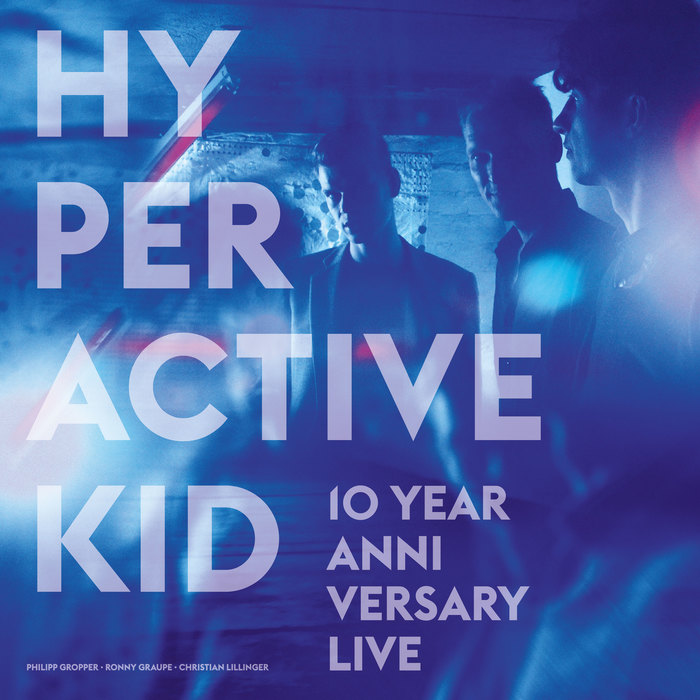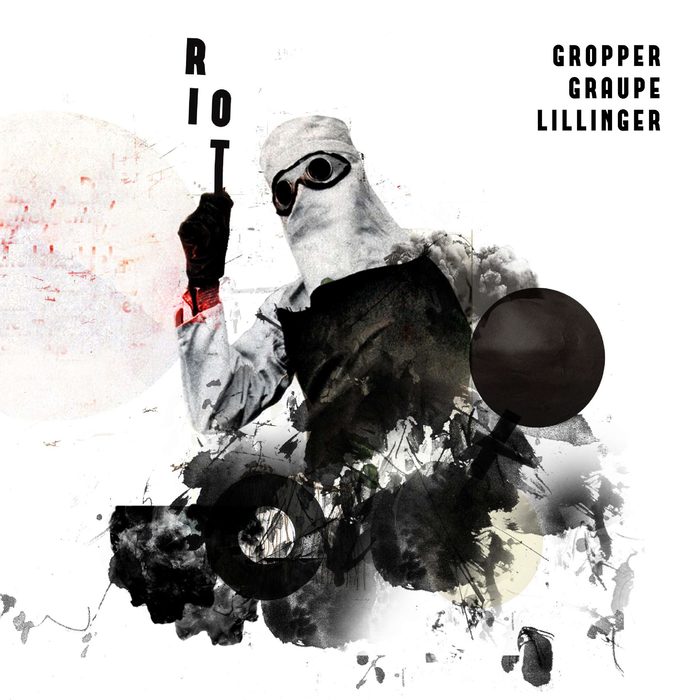10 Year Anniversary Live by Gropper/Graupe/Lillinger
2015 WhyPlayJazz (RS016LP), Vinyl LP + MP3 Album Download
Line-up
Philipp Gropper (ts), Ronny Graupe (git), Christian Lillinger (dr)
Production credits
Recorded December 2013 by Gleb Zagrebin live at A-Trane, Berlin, Germany. Mixed by Marck Fuck. Mastered by Klaus Scheuermann. Artwork by Natalie van Sasse van Ysselt.
Recorded live at the legendary A-Trane Club in Berlin, this recording proposes a kind of retrospective summary of the decade long history of the Berlin-based trio, quite appropriately called Hyperactive Kid, which consists of saxophonist Philipp Gropper, guitarist Ronny Graupe and drummer Christian Lillinger. With four albums to their credit and a reputation of „never a dull moment“ live performances the trio is an integral part of the avant-garde Berlin scene, which, similar to other European Capitals, seems to be rapidly developing since the turn of the Millennium, creating a Renaissance of ambitious European Jazz and Improvised Music after at least a couple of decades of relative stagnation. In the past ten years, Hyperactive Kid has performed countless concerts on five continents and has managed to form a sound and musical conception very much their own. The album presents five original compositions, three of which were composed by Gropper, one by Graupe and the remaining one credited to all trio members.
As usual with today’s young generation of Jazz musicians, each of the trio members is active separately in other ensembles. Next to numerous duties as sidemen they each lead their own groups as well: Gropper is the head of PHILM as well as TAU, Graupe’s trio is called SPOOM, and Lillinger leads GRUND, a septet. This hectic activity seems to be a common characteristic of most young European musicians, who are apparently blessed with incredible amounts of creativity and talent, way to extensive to be contained within one setting.
The music of Hyperactive Kid is a highly energetic and emotional exchange of ideas and moods, bursting with spontaneity but also „well organized“ in a manner which makes it accessible to open-minded listeners. Freedom and cooperative discipline are well balanced and produce a stream of engaging and stimulating music, which keeps the listeners on their toes.
European Jazz still manages to reinvent itself and push its boundaries ever further away from the stale mainstream tradition. The musicians of this trio belong to a generation to whom much of the credit of revitalizing the European scene is due. Hyperactive Kid managed to amalgamate many of the different “spirits” which were in the air ten years ago into a very intelligent and extremely rich music. By diligently continuing their work, staying together and choosing to continually go deeper, they have become somewhat iconic for this generation and a model of work and sonic coherence. Now that they have fully come into their own and continue to fearlessly explore the Jazz aesthetic, often against all odds, shunning from fads and fashions of contemporary non-culture, we as listeners are able to see our beloved music alive and kicking, going through another stage of its evolution. Gropper, Graupe, Lillinger and their colleagues all over Europe are our hope for the survival of what we consider true Culture, even if we need to enjoy it in the catacombs rather than in the amphitheaters. Come to think of it, the program on hand in the catacombs has always been more interesting, anyway.
Reviews
Mit einer unglaublichen Wucht und dem ihr eigenen Ergebnis aus Zusammenarbeit, Disziplin und Freiheit hat die Band des Saxofonisten Philipp Gropper und der beiden Rolf-Kühn-Unit-Mitglieder Graupe und Lillinger die neuen Berliner Sounds in die Welt exportiert – auf der Live-Aufahme ist gut zu hören, wie die drei Klangforscher kommunizieren und was sie verzückt, wie sie neue Strukturen gefunden, entwickelt und verinnerlicht haben, wie sie sich sperren gegen den kommerziellen Mief und sich gleichzeitig einem fiebrig romantisierten Avantgarde-Idyll verpflichtet haben. Auch in den Titeln der fünf Kompositionen wird spürbar, was das Referenzsystem des Trios hergibt: Von „Legacy“ über „Wes“, „Cocody“ und „Sound to Groove“ zu „Bloom“ – das Beste aus der Geschichte freischaffender Klanggewinnung leuchtet in den kurzweiligen Improvisationen des Trios auf, wird zerfetzt, geklebt, neu gestaltet und dokumentiert.
The fourth album of the Berlin-based Hyperactive Kid trio – tenor sax player Philipp Gropper, guitarist Ronny Graupe and drummer Christian Lillinger, all leaders of their own outfits and members of countless others – suggests how European free jazz may sound in the 21st century.
The album offers the trio aesthetics at its best – strong, opinionated musicians yet their music is framed in a highly collaborative interplay, well-versed in the legacy of jazz but with an independent sound of its own, not bound to any genre or style and intense but not addicted to sheer outbursts of energy.
The live recording from the legendary A-Trane Club in Berlin and features the trio developing stimulating, non-linear pieces as a highly creative unit that knows how to balances between the urgent need for individual freedom and disciplined, supportive interplay. Each piece demonstrates differently these qualities. The album begins with the ironic «Legacy» that stresses the trio refusal to subscribe to any kind of legacy. This short introduction set the atmosphere – loose, energetic interplay that patiently gels in its last seconds into a dense, cathartic eruption. The following «Wes» alternate between a playful, tough rhythmic module that gains more power and more volition, but suddenly morphs into abstract, moody sonic searches. «Cocody» plays on a similar formula – urgent, swinging pulse, obscured suddenly by contemplative segments and back to the irresistible, rhythmic ride. «Sound to Groove» highlight the disciplined shaping of a spare theme, patiently moves between short, silent pauses until its tension reaches its climax and then gravitates to a free-form, rhythmic edge.
The last and longest piece, the 17-minutes «Bloom», summarizes all former approaches – explorative sonic musings, deep, emphatic interplay and rich palette of sounds that patiently accumulate into energetic flow of surprising ideas, that keeps the spirit of tension and danger throughout this impressive piece.
Aufgenommen live im Berliner Jazzclub A-Trane, sprüht diese LP nur so vor Energie, Dynamik, individueller Intensität, Spielfreude, Spielwitz und innovativen Klangkombinationen. Musik frei, freier, am freiesten. Frei vor allem für ganz persönliche Entdeckungsreisen in den Klangkosmos dieser drei Avantgardisten. Und selbst wer bei diesem freien Fall ins Wunderland der freien Klänge nach Haltegriffen sucht, wird fündig: „Legacy“ können Jazzgeübte irgendwo in der Geschichte des freien Jazz verorten, „Wes“ bezieht sich natürlich (unter anderem) auf Wes Montgomery, „Cocody“ kokettiert mit Rock-Attitüden, „Sound to Groove“ wird dominiert von groovenden Saxophonklängen, und „Bloorn“ - ist wohl ganz einfach Hyperactive Kid. Diese Musik klingt natürlich vom Vinyl noch einige Male intensiver als von CD.
Schlagzeuger Christian Lillinger, 1984 geboren, ist gut fünf Jahre jünger als seine beiden Freunde und Bandmates, Saxofonist Philipp Gropper, 1978 geboren, und Gitarrist Ronny Graupe, 1979 geboren. Dass sie nun, noch so jung, als Trio Hyperactive Kid tatsächlich auf zehn Jahre Bandgeschichte zurückblicken, ist überraschend und faszinierend zugleich. Überraschend, weil Hyperactive Kid es seinem Publikum nie leicht gemacht hat: mit einer tief in der Kultur Europas verwurzelten Musik, die wie selbstverständlich etwa die brachial energetischen Soundgewitter des Rock mit den sperrigen Clustern und gebrochenen Rhythmen einer improvisierten Avantgarde in Einklang bringt. Faszinierend deshalb, weil sich Gropper, Graupe und Lillinger das Bilderstürmerische, das Anarchistische und ihre emotionale Freiheit vergangener Jahre bewahrt haben und auch heute noch mit ihrer nicht alltäglichen Improvisationsmusik trittsicher den Weg wählen, der am Steinigsten zu werden verspricht.
Auch zehn Jahre nach ihrer Gründung haben Hyperactive Kid nichts von ihrer quecksilbrigen Dynamik verloren, vielmehr zeigen sie vorbildlich, dass man, um energisch zu sein, nicht permanent bei maximaler Lautstärke operieren muss. Manchmal entwickeln sie die Dinge ganz behutsam. "Sound to Groove" etwa beginnt mit scheinbar strukturlos vor sich hin stolpernden Stakkato-Tönen, um aus diesen versprengten Molekülen den titelgebenden Groove entstehen zu lassen. Das hyperaktive Kind, das die Musiker gemeinsam bilden, ist erwachsener geworden. Doch die spontane Entdeckungsfreude ist immer noch vorhanden.
Le loro composizioni non cedono mai all'espressione per sezioni e trasformano così tempo e spazio sonoro in un unico suono, percepibile come una soluzione di logica continuità: attraverso network sonori inimmaginabili prima della loro costituzione, creano collegamenti tra ambienti e linguaggi della musica che lasciano a bocca aperta anche i più esperti ascoltatori, per la coerenza della costruzione sintattica e timbrica. Dal vivo sposano una straordinaria ed efficace sensibilità musicale: quella che attiene ad un perfetto equilibrio tra le ragioni del cuore e della mente. È la musica di oggi.

